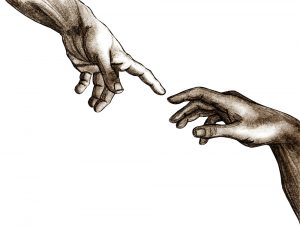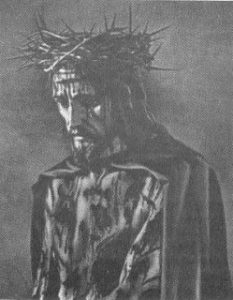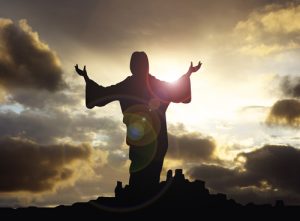Whenever evil, plague, war, death and disaster befall society, various reactions emerge spiritually within the community; From the secular atheist, a cynical mocking of the all good God; From the doubting faithful, a existential dilemma of faith and reason; From the faithful, a twofold reaction, one of faith supplied with reason and prayer, and the other, fueled with a faith devoid of reason and careless actions.
The primary and first question deals with evil and a good God. The cynical atheist will mock the faithful for believing in a God that allows disaster and plague to befall creation. The atheist will offer a false two fold conclusion that either God is not all good to permit evil, or not all powerful to prevent it. What is being ignored is the fundamental fact that humanity through its own choice lives in a fallen world. Free will chooses evil, not God. The price of being autonomous is evil. It is something that God in his all omniscient mind found well worth the price of evil. The price for His sentient life forms to choose good or evil.

This choice of free will plays a key role why evil exists. God did not create evil nor does He will it, nor does he not have the ability to control it. God permits it for a greater cause, humanity’s autonomy and overall eternal life outside the temporal world. While this does not address the day to day hardships of disaster and plague, it does illuminate a path beyond this valley of tears.
In Christianity, God does not abandon His creation. Instead, God Himself, takes upon human nature, binding to His Divinity the the Person-hood of Jesus Christ. Jesus accepts the cold of the temporal world and opens Himself to the pains of disaster and plague. Jesus allows Himself to be the sacrifice for all sin and bears its ugly face, but before that, He also endured the pains of this world and the suffering of loss, grief, death and tragedy.

Christianity presents an excellent answer to the problem of evil. It presents a God, who does not watch from a distant throne, but one who enters into the human condition and suffers with His creation as an act of free will and love.
While this question will not answer the disbelief of an atheist it at least answers the supposed riddle of a good God and evil. God is clearly good and His reason for permitting evil is clearly understood.
The doubting faithful represent the second response to spirituality and disaster and plague. The doubting faithful question why God permits them to suffer. Some may understand the theological response listed above, while others may not, but the doubting faithful, begin to doubt God Himself, His existence, and even their own faith. When plague or disaster strikes humanity, they wonder if God is there or if even God can hear their prayers.
They doubt the value of prayer. They begin to doubt if God can perform a miracle and save others from disaster. They question their prayer’s worth. Why pray if God will not act? The doubting faithful see prayer as a contract not a covenant. If prayer is not answered, then either God is not there or their prayer is insufficient. This leads to a poor understanding of suffering and grief in Christian spirituality.
Prayer when offered as petition definitely has a request but when the end of that request becomes the only driving spiritual force then the prayer is open to only one’s will and not God’s will. One should pray with the fervent attitude of deliverance, but if that physical deliverance does not come, one should not doubt God’s presence or one’s lack of one’s own spirituality. Instead, prayer while seeking one’s desired end, should also seek God’s end. It may seek conclusion but must be open to a conclusion that is not what one desires. Prayer must seek God’s presence to help carry one through grief, disaster and plague, whether cure or deliverance is given or not.

If a prayer is not answered according to one’s will, it does not mean God cannot perform miracles, or that God does not care, but it means that God has a different path and will than one’s own. One must instead believe that God knows best despite the suffering. One must instead, imitate Christ, who accepted the Father’s will even if it meant His own death. One may rejoice in the miracles that can occur, but if they do not, one must rejoice silently in God’s plan, no matter how painful or confusing it may be.
Ultimately, the spiritually doubtful, must re-evaluate their own spiritual life and the true essence of prayer, if they wish to understand why God answers and not answers some prayers.
Finally, in disaster and plague, one can see the two responses from the faithful whose faith is not suppressed but strengthened in times of chaos. The first response is one of prayer and reason. The second, is a prayer and faith devoid of reason and careless action.
The first response is the response of the church faithful. It understands the theology of good and evil, one’s role in it and the role God plays in answering prayer. The faithful pray in covenant with God, knowing that God will always be present physically and spiritually in their lives. The faithful believe miracles can happen but are also prepared to suffer and offer suffering through Christ to God the Father. They are willing to prayer but are also equally willing to carry their cross.
The second response though is devoid of reason. It challenges reason and in many ways tests God. Like those who handle serpents as a testimony of faith, these individuals will disregard precautions in time of plague in the name of faith. They will congregate together in Jesus name despite a contagious virus and will question the faith of others for believing bad things can happen. While the bible and church history is full of stories of God preserving individuals from illness or disaster, there are also equally many stories of disaster.
While it is possible that during reception of communion that Christ would preserve a person from a contagious virus, it is also possible that the virus still could infect. This is based on multiple issues regarding the person’s spiritual state but also the will of God. It is unadvised to tempt God unless God Himself has appeared to oneself. To boldly take dangerous actions within the spiritual community is not only unsafe and illogical but also not Christ centered.
In some cases, one has seen saints survive disease in care of others, while in other cases, history has witnessed saints who have died for those they cared for. Hence, acts of faith against logic and reason cannot be presumed to be immune to natural consequences. Yes, God can miraculously prevent the transmission of a virus during Communion, but it does not necessarily happen. This is why in times of plague, the Church while optimistic, always errors on the side of caution. Services, masses and gatherings are closed during times of plague because the Church does not wish to tempt God. This is not a lack of faith. If God so chose to command faith, He would, but if He does not, following reason and safety in no way invalidates faith.
Instead, God expects obedience. Obedience to ecclesiastical and civil authority over one’s own ideas.

Hence, prayer and reason is the proper response to any disaster or plague. It is measured with faith and believes in miracles but it is also measured with reason and obedient to authority in time of crisis and disaster. Prayer in times of crisis is not a useless endeavor but carries great merit and can produce great things, but ultimately is tied to the will of God and not one’s own will. It is a prayer of covenant and not contract that seeks to imitate Christ.
Bad things can happen to the most devout, even in one’s most deepest prayer, so one should not take heart that one’s prayer was not answered. Instead, one should understand that like Christ, miracles can occur, but when they do not, one must be ready to suffer like one’s Master. Christ suffered, He grieved and He offered His will to the Father. Christians and followers of Christ are asked to accept no less. The world denounced Christ and Christians can expect no less than their Master.
During disaster and plague, pray, pray and pray more. Expect great things but also expect suffering if it is God’s will, but know no matter the outcome, Christ will be with the suffering in this fallen world.
If you would like to learn more about Christian Counseling Training, then please review the certification program offered through AIHCP. The program is online and independent study and offers a four year certification for qualified professionals.












